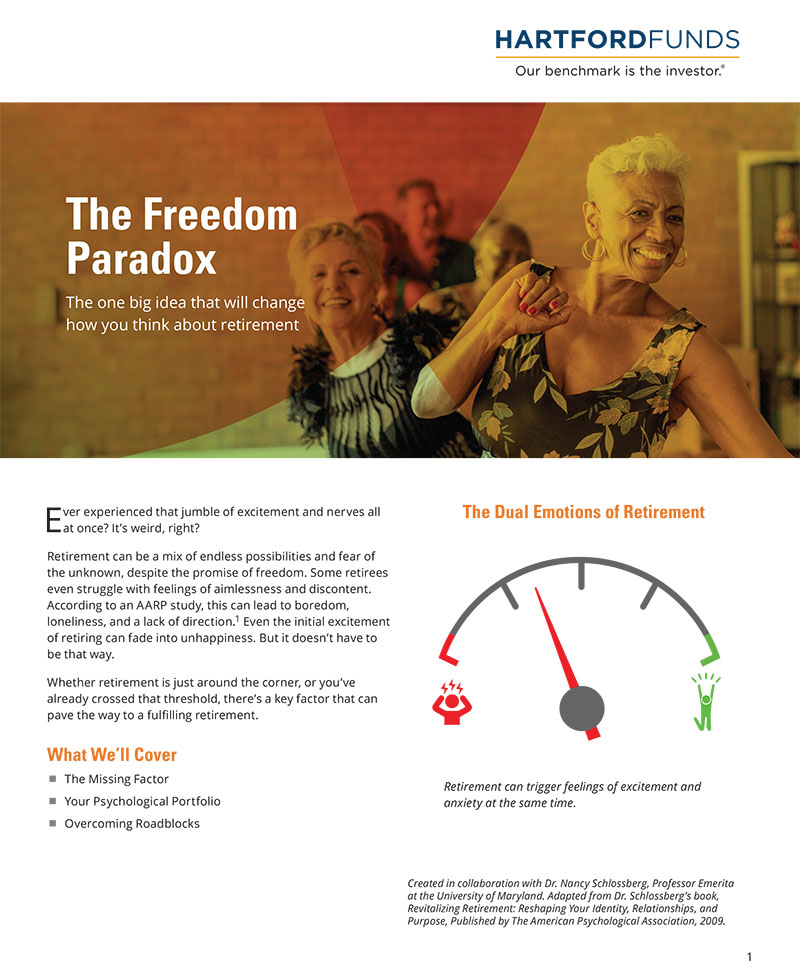How to Handle Life’s “Nonevents”
Coping with life transitions can be difficult for anyone. We expect big changes to affect us emotionally, whether positively or negatively. When we face an event such as starting or losing a job, retiring, moving, getting married (or remarried) or losing a loved one, our friends and family typically rally around to provide emotional support.
But when something we planned or counted on doesn’t happen, we may not recognize the emotional impact—even though the adjustment may be just as challenging. That makes these nonevents especially hard for us to cope with.
WHAT ARE NONEVENTS?
Nonevents are changes you expected to happen but that do not occur as you had hoped.
Examples: You worked hard to receive a promotion that didn’t come…you planned to retire at a certain age, but you do not have enough money to stop working…you were looking forward to becoming a grandparent, but your children choose not to have children of their own. There are many more expected things that just don’t happen.
These disappointed expectations can affect your life in profound ways. You may feel a deep sense of failure or loss. Your identity and assumptions about your place in the world may be challenged. You may question your competence and worth.
Example #1: A man who always wanted to be a commercial pilot joined the Navy and was trained to fly. When he left the military, he was crushed that he couldn’t get a job with a major airline. He became a lawyer and no longer felt comfortable calling himself a pilot, but he deeply missed that identity. He felt envious of his friends who were working in areas that they felt passionate about.
Example #2: A 60-year-old woman expressed dismay that she never became the poet she expected to be. She had received poetry awards when she graduated from college, but after that, nothing happened. She was unable to get her work published and eventually gave up. She kept thinking about what might have been.
DIFFERENT TYPES
My colleagues and I at University of Maryland interviewed more than 100 people of all ages about how nonevents changed their lives. We identified several different categories of nonevents. Some nonevents are personal—they stem from our own choices, abilities and limitations.
Example: A woman always expected to lose the weight she gained decades earlier when she was pregnant. At age 60 and after many unsuccessful diets, she concluded that she would never have the slim figure she longed for.
Other nonevents are ripples, resulting from life choices made by the people around us.
Example: Not becoming a grandparent because your children don’t have children.
There is a third category we investigated as well—it’s not technically a nonevent but an event that turns out to be delayed, though it feels like a nonevent for many years to the person experiencing it.
Example: A woman who finally accepts that she will never marry and lives with her nonevent for decades. Then she meets someone at age 70 and marries for the first time, turning her nonevent into an event.
Because nonevents often are invisible to others, the people who experience them are likely to suffer alone. Those around them may not realize that support is needed. No one throws you a party for the book that did not get published or brings you chicken soup to comfort you about the grandchild you never had. This lack of support can prolong unhappiness and make it difficult to move on. But you can move on and become happier if you know how to help yourself with nonevents.
RECOVERING FROM NONEVENTS
My colleagues and I have found that people who recover successfully from nonevents follow these three steps…
1. Acknowledge the loss. Nonevents can be harder to spot than event-related transitions because they tend to be more gradual—the cherished goal or dream recedes further and further away. It is important to acknowledge what is bothering you and why you are feeling dismayed. You need to label the loss as a nonevent and tell the people close to you what you are experiencing.
Example: A former professor who ran a government agency was shaken when he learned that two of his former students had surpassed his professional achievements. Instead of being satisfied about the contribution he had made to the next generation, he felt envious and diminished. Only after admitting his disappointment in his own academic accomplishments was he able to refocus and begin taking pride in his former students’ success.
Helpful: Tell the story of your lost dream to people you trust. Choose people who can listen empathetically and won’t try to minimize your disappointment or try to talk you out of your feelings. If family and friends don’t have this ability, talk to a therapist or clergyperson.
2. Grieve. Separating from a dream takes time, and the pain of disappointment may come and go in cycles. Find ways to express your grief.
Examples: Write in a daily journal…cry if you have the urge…seek spiritual solace in a house of worship or with a meditation group.
3. Refocus. This is the time to let go of old expectations and look at your nonevent differently. You need to begin to think of possible new ways you might live your life and identify new goals and dreams.
Developing rituals or rites of passage is a way to help people separate from the past and move to a new place.
Example: A young woman who had given up hope of marrying sent an announcement to her friends and family members saying that she was moving into a beautiful new apartment and that she had registered for housewarming gifts at Macy’s.
Shifting focus is necessary as we shape new goals by identifying a new dream, a new vision, a new self.
Example: The lawyer who had wanted to become a commercial pilot began to see himself as someone with a satisfying hobby—he bought a small plane that he used to visit family and go on business trips. He realized that flying was essential to his well-being and that he could fly for fun instead of as a career. This outlet freed him to find enjoyment in his law career.
Because life does not follow a preordained script, it is important to have backup plans. All of us will have scripts for our lives that are interrupted and do not go according to plan. We cannot count on life just following a neat, arranged, linear script.


